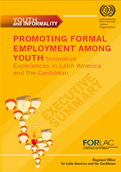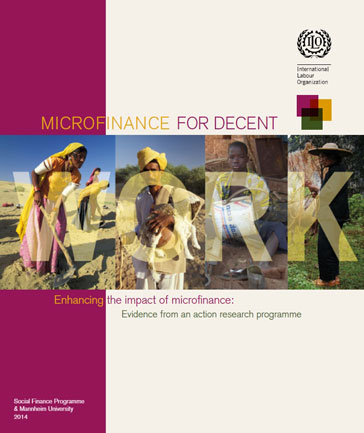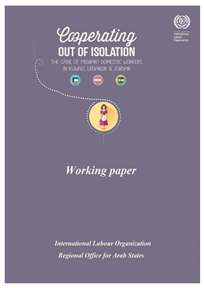Resources on future of work
-

Publication
Effective responses to HIV and AIDS at work: A multi-country study in Africa
24 April 2015
This ILO study presents a comprehensive assessment of the characteristics that make HIV and AIDS workplace initiatives effective.
-

Publication
Promoting formal employment among youth: innovative experiences in Latin America and the Caribbean.
20 April 2015
Formalizing employment, particularly youth employment, continues to pose a challenge for the countries of the region. Currently, 13% of youth are unemployed and 55.7% are informally employed (ILO 2013 and ILO 2014). The challenge of enabling the new labour force to actively participate in the labour market is compounded by the additional challenge of guaranteeing that the new jobs meet decent work criteria.
-
Publication
Employment protection legislation: Summary indicators in the area of terminating regular contracts (individual dismissals)
27 March 2015
-

Work4Youth Publications
Labour market transitions of young women and men in Eastern Europe and Central Asia
26 March 2015
This report presents the results of the School-to-work transition surveys (SWTS) implemented in six countries in the Eastern Europe and Central Asia region – Armenia, Kyrgyzstan, Republic of Moldova, Russian Federation, the former Yugoslav Republic of Macedonia and Ukraine – in 2012 or 2013. The indicators resulting from the surveys and analysed in this report provide a much more detailed picture of the youth in the labour market in a part of the world where unemployment rates are among the highest in the world.
-

Publication
Women and the Future of Work – Taking care of the caregivers
13 March 2015
Over the last 20 years, important achievements have been made with regards to gender equality in the world of work. At least 50% of the world’s women are in paid wage and salary employment – an increase of 10% since the 1990s. In 2014, women held 24% of the world’s senior management positions, compared to 19% ten years ago.
-

After the crisis
Challenges for labour markets now and in the future
27 February 2015
In a statement delivered at the Institute of International and European Affairs, ILO Director-general Guy Ryder examined the state of labour markets and the drivers of major change, at a time when governments across the globe are giving priority to generating growth and jobs. He also addressed the policy challenges ahead for governments and for the ILO, in the run-up to the ILO’s 100th anniversary in 2019.
-

Publication
Microfinance for Decent Work – Enhancing the impact of microfinance: Evidence from an action research programme
17 February 2015
-
Discussion paper
Promoting decent work for migrant workers
13 February 2015
Migration today is linked, directly or indirectly, to the world of work and the quest for decent work opportunities. As a result, there can be no discussion of international migration in the future global agenda on sustainable development without consideration of decent work. This paper proposes a number of indicators to measure target 8.8 of the Sustainable Development Goals on “protecting labour rights and promoting safe and secure working environments of all workers, including migrant workers, particularly women migrants, and those in precarious employment”.
-

Publication
Handbook on HIV and AIDS for labour inspectors
12 February 2015
GED/ILOAIDS develops a new Handbook, in collaboration with LABADMIN/OSH, to strengthen labour inspectors’ capacity to address HIV and AIDS —including discrimination, gender equality and occupational safety and health issues— in their day-to-day work.
-

Working Paper
Cooperating out of Isolation: The Case of Migrant Domestic Workers in Lebanon, Jordan and Kuwait
12 February 2015
While countries globally are moving towards recognizing domestic workers under their labour legislation, limited protection is provided to more than two million domestic workers working and living in the Middle East. The majority of these workers are migrant women and while for many of them, migration is an enriching experience, others face a journey of fear and unfair treatment.